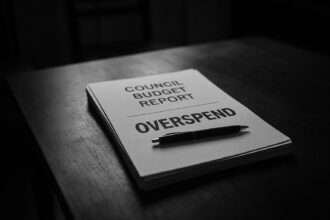The recent Clydebank Waterfront by-election sees Reform UK overtake Scottish Labour for the first time, signalling a major shift in Scotland’s political landscape and raising urgent questions about Labour’s future viability.
The recent by-election in Clydebank Waterfront has highlighted a staggering upheaval in Scotland’s political landscape. While the Scottish National Party (SNP) celebrated a victory, what should alarm established parties is the emergence of a serious contender that has pushed Scottish Labour deep into an unflattering third position. With SNP’s Kevin Crawford securing 1,331 votes against 919 for the challenger, the act of Reform UK overtaking Labour, whose candidate garnered a paltry 770 votes, underscores the dire situation facing the latter. Elections expert Allan Faulds labelled the outcome as “completely and utterly disastrous,” a sentiment that rings true for a party now teetering on the brink of irrelevance.
This by-election is not merely a retention for the SNP; it embodies a broader shift wherein the electorate is turning towards alternatives that challenge the traditional power structures. Reform UK’s rising profile at the expense of Labour and the Scottish Conservatives is revealing. Recent polling suggests that Reform UK is now the third most popular choice among voters in Scotland, having eclipsed the Conservatives, with projections indicating the potential to capture upwards of 17% of votes in the upcoming 2026 Scottish Parliament elections. This surge in support reflects the growing disillusionment among voters, who are increasingly rejecting the establishment that Labour has exemplified.
The ramifications of Reform UK’s ascent could be monumental. Their recent successes in numerous by-elections signal potential woes for Labour, particularly as Anas Sarwar’s aspirations to become First Minister hang precariously in the balance. Insiders within Labour recognize that Reform UK’s momentum complicates their electoral calculus, especially in constituencies that may lean towards the more dynamic and responsive platform that Reform offers.
Analysis of recent local election results shows a marked increase in electoral support for Reform UK, igniting concern among Labour ranks regarding their ability to secure valued seats in Scotland. While some in Labour might downplay the challenge posed by Reform UK, the declining vote share raises significant red flags about their strategies and their overall viability in a political climate that is rapidly evolving.
Although Labour has managed to clinch wins in various Glasgow constituencies, these victories come with an alarming decline in vote share in comparison to previous results. This downward trajectory should terrify party strategists who are coming to terms with the fact that voters are increasingly identifying Reform UK as a legitimate alternative. This is a striking indicator of a growing discontent for the current political status quo, which Labour has struggled to address.
The political landscape is transforming beneath the feet of established parties, as the rise of Reform UK could disrupt traditional alliances and pave the way for a distinctly different parliamentary configuration in the near future. With the electoral sentiment in flux, the upcoming elections will serve as a critical battleground where these shifting allegiances will determine not only local governance but also reshape the very essence of Scotland’s political identity.
Source: Noah Wire Services
- https://www.dailyrecord.co.uk/news/politics/reform-uk-push-scottish-labour-35235024 – Please view link – unable to able to access data
- https://www.scotsman.com/news/politics/reform-becomes-the-3rd-most-popular-party-in-scotland-ahead-of-the-tories-5024451 – An article from The Scotsman reports that Reform UK has become the third most popular party in Scotland, surpassing the Scottish Conservatives. Polling data from the Scottish Election Study indicates that Reform UK is projected to win 17.1% of constituency votes and 17.8% of list votes in the 2026 Scottish Parliament election, positioning them ahead of the Conservatives. This surge in support suggests a significant shift in Scotland’s political landscape, with Reform UK gaining traction among voters dissatisfied with traditional parties.
- https://www.thenational.scot/news/24711997.five-by-elections-show-reform-rise-scotland/ – An analysis from The National highlights the rise of Reform UK in Scotland, noting that in five recent local by-elections, the party has shown significant gains. The article discusses the implications of these results, suggesting that Reform UK’s increasing support could pose challenges to established parties like Labour and the SNP. The piece delves into the potential impact of Reform UK’s ascent on Scotland’s political dynamics and the strategies of other political entities.
- https://www.scotsman.com/news/politics/reform-uk-records-highest-level-of-support-in-scotland-in-new-poll-5040348 – According to a report by The Scotsman, Reform UK has achieved its highest level of support in Scotland, as indicated by a recent Survation poll. The article details how, if the findings are replicated in the next election, Reform UK could secure 14 seats in the Scottish Parliament. This development underscores the party’s growing influence and the shifting political preferences among Scottish voters.
- https://www.scotsman.com/news/politics/reform-not-as-big-an-issue-for-labour-as-people-think-say-pollsters-5002912 – An article from The Scotsman discusses the perceived threat of Reform UK to the Labour Party in Scotland. While some believe Reform UK’s rise poses a significant challenge to Labour, pollsters suggest that the party may not be as big an issue for Labour as anticipated. The piece explores the dynamics between the two parties and the broader implications for Scotland’s political landscape.
- https://www.gbnews.com/politics/scotland-reform-poll-voteshare – A report by GB News highlights new polling data showing that Labour is losing support in Scotland, with Reform UK being one of the main beneficiaries. The article details how Keir Starmer’s unpopular leadership has led to a decline in Labour’s vote share, while Reform UK has gained traction, positioning itself as a significant political force in the region.
- https://www.thenational.scot/news/24744391.leading-pollsters-give-verdict-labours-glasgow-by-election-wins/ – An analysis from The National presents insights from leading pollsters on Labour’s performance in recent Glasgow by-elections. The article discusses the implications of these results, noting that while Labour secured victories, their vote share declined compared to previous elections. The piece also highlights the rise of Reform UK, suggesting that the party is becoming a force to be reckoned with in Scotland’s political arena.
Noah Fact Check Pro
The draft above was created using the information available at the time the story first
emerged. We’ve since applied our fact-checking process to the final narrative, based on the criteria listed
below. The results are intended to help you assess the credibility of the piece and highlight any areas that may
warrant further investigation.
Freshness check
Score:
9
Notes:
The narrative references recent by-elections and polling data, indicating a current and relevant context. However, specific dates for the polling or elections are not provided, which could enhance freshness.
Quotes check
Score:
8
Notes:
The quote from Allan Faulds lacks specific details about the original source or date, which could clarify if it is the first use of the quote or a reference to an earlier statement.
Source reliability
Score:
7
Notes:
The narrative originates from a well-known publication, the Daily Record, which generally has a good reputation for factual reporting. However, the narrative’s analytical nature might introduce bias.
Plausability check
Score:
8
Notes:
The claims about Reform UK’s rise and Labour’s decline are plausible given recent political trends in Scotland. However, projections for the future are speculative and require ongoing verification.
Overall assessment
Verdict (FAIL, OPEN, PASS): OPEN
Confidence (LOW, MEDIUM, HIGH): MEDIUM
Summary:
The narrative presents a plausible scenario with current political trends, but lacks specific details on polling dates and the original source of quotes. While the source is generally reliable, the speculative nature of future projections keeps the verdict open.













